英语时态教案
小学英语四种时态概述教案
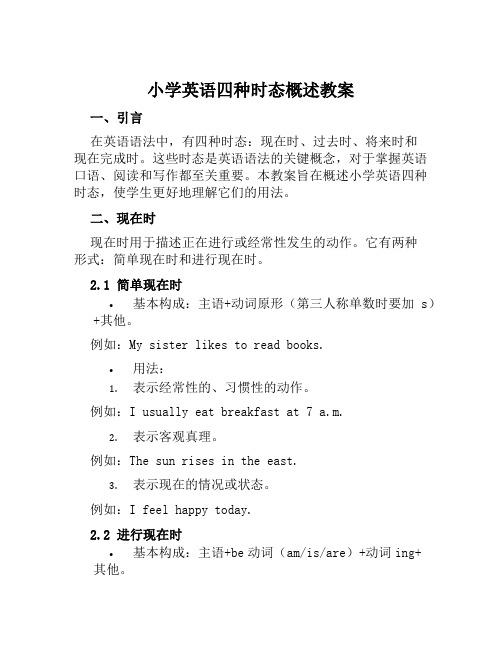
小学英语四种时态概述教案一、引言在英语语法中,有四种时态:现在时、过去时、将来时和现在完成时。
这些时态是英语语法的关键概念,对于掌握英语口语、阅读和写作都至关重要。
本教案旨在概述小学英语四种时态,使学生更好地理解它们的用法。
二、现在时现在时用于描述正在进行或经常性发生的动作。
它有两种形式:简单现在时和进行现在时。
2.1 简单现在时•基本构成:主语+动词原形(第三人称单数时要加s)+其他。
例如:My sister likes to read books.•用法:1.表示经常性的、习惯性的动作。
例如:I usually eat breakfast at 7 a.m.2.表示客观真理。
例如:The sun rises in the east.3.表示现在的情况或状态。
例如:I feel happy today.2.2 进行现在时•基本构成:主语+be动词(am/is/are)+动词ing+其他。
例如:She is reading a book.•用法:1.描述正在进行的动作。
例如:I am cooking dinner.2.描述现在正在发生的事情。
例如:He is talking to his friend on the phone.三、过去时过去时用于描述已经完成或发生过的动作或事件。
它有两种形式:简单过去时和进行过去时。
3.1 简单过去时•基本构成:主语+动词过去式+其他。
例如:I played soccer yesterday.•用法:1.描述过去发生的动作或事件。
例如:I went to the movies last night.2.表示过去一个时间段内重复发生的动作。
例如:I visited my grandmother every summer when I was young.3.用于虚拟语气和条件语句中。
例如:If I had more money, I would travel around the world.3.2 进行过去时•基本构成:主语+was/were+动词ing+其他。
英语四大时态教案模板范文

课时:2课时教学目标:1. 让学生掌握英语四大时态:一般现在时、现在进行时、一般过去时和一般将来时。
2. 培养学生正确运用时态表达不同时间发生的动作或状态的能力。
3. 培养学生运用时态进行日常交流的能力。
教学重点:1. 四大时态的构成及用法。
2. 不同时态的句型结构。
3. 时态在语境中的应用。
教学难点:1. 四大时态的区分及运用。
2. 时态在语境中的灵活运用。
教学过程:第一课时一、导入1. 引导学生回顾已学过的英语语法知识,如名词、代词、形容词等。
2. 提问:在英语中,如何表达动作或状态发生的时间?二、新课讲解1. 介绍四大时态的概念及定义。
2. 分别讲解一般现在时、现在进行时、一般过去时和一般将来时的构成、用法及句型结构。
3. 结合例句,让学生理解四大时态的用法。
三、练习1. 完成教材中的相关练习题,巩固所学知识。
2. 教师选取一些生活场景,让学生运用所学时态进行口语练习。
四、小结1. 总结四大时态的构成、用法及句型结构。
2. 强调时态在语境中的应用。
第二课时一、复习1. 复习上一节课所学的四大时态。
2. 学生进行口语练习,教师纠正发音和语法错误。
二、巩固1. 教师选取一些练习题,让学生巩固所学知识。
2. 学生分组进行小组讨论,互相提问、解答。
三、拓展1. 介绍时态在英语写作中的应用。
2. 让学生运用所学时态写一篇短文。
四、总结1. 总结本节课所学内容。
2. 布置课后作业,巩固所学知识。
教学评价:1. 课堂练习的正确率。
2. 学生口语表达的正确性和流利度。
3. 学生课后作业的质量。
教学反思:1. 教师应根据学生的实际情况,调整教学进度和难度。
2. 注重学生的实际运用能力,提高学生的英语水平。
3. 鼓励学生积极参与课堂活动,提高学生的学习兴趣。
初中八种时态教案

初中八种时态教案教学目标:1. 了解和掌握八种基本英语时态:一般现在时、一般过去时、一般将来时、现在进行时、过去进行时、过去将来时、现在完成时和过去完成时。
2. 能够正确运用这八种时态进行句子表达。
3. 能够理解不同时态的用法和区别。
教学重点:1. 八种基本英语时态的名称和结构。
2. 八种时态的用法和区别。
教学难点:1. 不同时态的用法和区别。
2. 正确运用八种时态进行句子表达。
教学准备:1. PPT展示八种时态的名称、结构和用法。
2. 练习题用于巩固所学知识。
教学过程:Step 1: 引入- 向学生介绍本节课的主题:初中英语八种时态。
- 解释时态在英语中的重要性,以及它如何使句子更加生动和具体。
Step 2: 讲解- 一般现在时:表示习惯性动作或存在的状态,使用动词原形。
- 一般过去时:表示过去发生的动作或状态,使用动词的过去式。
- 一般将来时:表示将来会发生的动作或状态,使用will + 动词原形或be going to。
- 现在进行时:表示正在进行的动作,使用am/is/are + 动词ing形式。
- 过去进行时:表示过去正在进行的动作,使用was/were + 动词ing形式。
- 过去将来时:表示过去将来会发生的动作或状态,使用would/could/might + 动词原形。
- 现在完成时:表示过去发生的动作对现在造成的影响或结果,使用have/has + 过去分词。
- 过去完成时:表示过去过去发生的动作,使用had + 过去分词。
Step 3: 练习- 分组练习:每组选择一种时态,用例子展示该时态的用法。
- 个别练习:学生独立完成练习题,老师进行个别指导。
Step 4: 总结- 回顾本节课所学的八种时态,强调它们的用法和区别。
- 鼓励学生在日常生活中多使用这些时态,提高英语水平。
Step 5: 作业- 布置作业:要求学生运用八种时态编写一段小故事。
教学反思:本节课通过讲解和练习,让学生了解了初中英语八种基本时态的名称、结构和用法。
初中英语时态系列教案

初中英语时态系列教案教学目标:1. 理解并掌握四种基本时态:一般现在时、一般过去时、一般将来时和现在进行时。
2. 能够正确运用这四种时态进行句子的构造和表达。
3. 能够识别并理解这四种时态的时间状语。
教学内容:1. 一般现在时:表示经常发生的动作或存在的状态。
时间状语有:always, usually, often, sometimes, seldom, never, every day等。
2. 一般过去时:表示过去的动作、行为或状态。
时间状语有:yesterday, ago, in 1989, once, last week (month, year), at that time, just now等。
3. 一般将来时:表示将来时间。
时间状语有:tomorrow, next week, in a week等。
4. 现在进行时:表示现在时刻正在进行的动作或表示现阶段正在做的事情。
时间状语有:now, at this moment等。
教学步骤:1. 引入:向学生介绍时态的概念和重要性。
解释时态是动词的形式,用来表示动作发生的时间。
2. 讲解:a. 一般现在时:解释一般现在时表示经常发生的动作或存在的状态。
举例说明如何使用时间状语。
b. 一般过去时:解释一般过去时表示过去的动作、行为或状态。
举例说明如何使用时间状语。
c. 一般将来时:解释一般将来时表示将来时间。
举例说明如何使用时间状语。
d. 现在进行时:解释现在进行时表示现在时刻正在进行的动作或表示现阶段正在做的事情。
举例说明如何使用时间状语。
3. 练习:a. 让学生分组,每组轮流造句,使用不同的时态。
鼓励学生使用时间状语。
b. 让学生完成时态练习题,包括选择题、填空题和句子构造题。
4. 总结:回顾所学的四种基本时态,强调它们的区别和用法。
鼓励学生在日常生活中多练习使用这些时态。
5. 作业:布置相关的时态练习题,要求学生回家后进行练习,并请家长签字确认。
八大时态复习教案

八大时态复习教案第一章:一般现在时1.1 教学目标:让学生理解一般现在时的概念和用法。
能够正确运用一般现在时描述习惯、状态和普遍真理。
1.2 教学内容:一般现在时的定义和构成。
一般现在时的肯定句和否定句结构。
一般现在时的常用动词。
1.3 教学活动:通过例句和练习让学生熟悉一般现在时的结构。
让学生通过小组讨论和造句来练习使用一般现在时描述习惯和状态。
设计练习题检测学生对一般现在时的掌握程度。
第二章:一般过去时2.1 教学目标:让学生理解一般过去时的概念和用法。
能够正确运用一般过去时描述过去发生的动作和状态。
2.2 教学内容:一般过去时的定义和构成。
一般过去时的肯定句和否定句结构。
一般过去时的常用动词。
2.3 教学活动:通过例句和练习让学生熟悉一般过去时的结构。
让学生通过小组讨论和造句来练习使用一般过去时描述过去发生的动作和状态。
设计练习题检测学生对一般过去时的掌握程度。
第三章:一般将来时3.1 教学目标:让学生理解一般将来时的概念和用法。
能够正确运用一般将来时描述将来发生的动作和计划。
3.2 教学内容:一般将来时的定义和构成。
一般将来时的肯定句和否定句结构。
一般将来时的常用动词。
3.3 教学活动:通过例句和练习让学生熟悉一般将来时的结构。
让学生通过小组讨论和造句来练习使用一般将来时描述将来发生的动作和计划。
设计练习题检测学生对一般将来时的掌握程度。
第四章:现在进行时4.1 教学目标:让学生理解现在进行时的概念和用法。
能够正确运用现在进行时描述正在进行的动作和状态。
4.2 教学内容:现在进行时的定义和构成。
现在进行时的肯定句和否定句结构。
现在进行时的常用动词。
4.3 教学活动:通过例句和练习让学生熟悉现在进行时的结构。
让学生通过小组讨论和造句来练习使用现在进行时描述正在进行的动作和状态。
设计练习题检测学生对现在进行时的掌握程度。
第五章:过去进行时5.1 教学目标:让学生理解过去进行时的概念和用法。
能够正确运用过去进行时描述过去正在进行的动作和状态。
中学英语基本时态教案

中学英语基本时态教案一、教学目标1. 让学生掌握英语的四个基本时态:一般现在时、一般过去时、一般将来时和现在进行时。
2. 培养学生运用基本时态进行交际的能力。
3. 引导学生正确运用时间状语与基本时态的配合。
二、教学内容1. 一般现在时:表示经常发生的动作或存在的状态。
2. 一般过去时:表示过去发生的动作或存在的状态。
3. 一般将来时:表示将来要发生的动作或存在的状态。
4. 现在进行时:表示正在进行的动作或存在的状态。
5. 时间状语与基本时态的配合。
三、教学重点与难点1. 重点:掌握四个基本时态的构成和用法。
2. 难点:时间状语与基本时态的配合。
四、教学方法1. 任务型教学法:通过完成各种任务,让学生在实践中学习和运用基本时态。
2. 情境教学法:创设各种情境,让学生在真实的语境中学习基本时态。
3. 互动式教学法:鼓励学生积极参与,进行小组讨论和角色扮演,提高交际能力。
五、教学步骤1. 引入:通过图片或故事引入基本时态的概念。
2. 讲解:讲解四个基本时态的构成和用法。
3. 练习:设计各种练习题,让学生巩固基本时态的用法。
4. 情境模拟:创设情境,让学生进行角色扮演,运用基本时态进行交际。
5. 总结:对本节课的内容进行总结,强调时间状语与基本时态的配合。
6. 作业布置:布置相关练习题,让学生课后巩固所学内容。
教学评价:通过课堂表现、作业完成情况和练习题的正确率来评价学生的学习效果。
六、教学拓展1. 引入其他时态的概念,如进行时、完成时和完成进行时,让学生对英语时态有更全面的认识。
2. 通过案例分析,让学生了解不态在实际语境中的运用。
七、教学案例1. 案例一:描述一个正在进行的体育比赛,要求学生运用现在进行时。
2. 案例二:描述一个过去发生的旅行经历,要求学生运用一般过去时。
3. 案例三:描述一个将来要发生的节日活动,要求学生运用一般将来时。
八、教学活动1. 小组讨论:让学生分组讨论,分享彼此的学习心得和经验。
初中四大时态教案
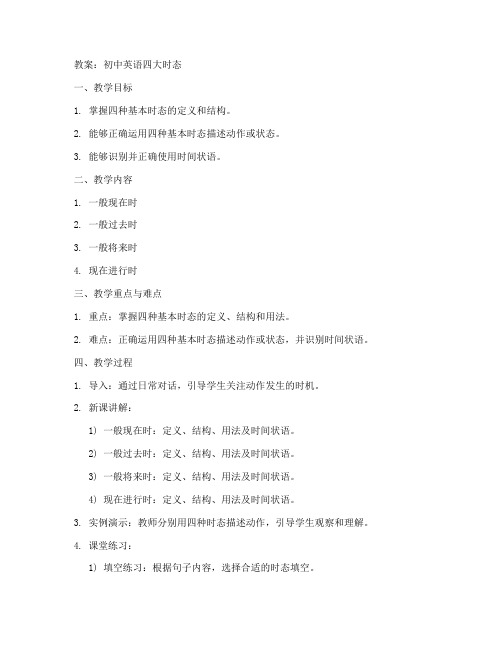
教案:初中英语四大时态一、教学目标1. 掌握四种基本时态的定义和结构。
2. 能够正确运用四种基本时态描述动作或状态。
3. 能够识别并正确使用时间状语。
二、教学内容1. 一般现在时2. 一般过去时3. 一般将来时4. 现在进行时三、教学重点与难点1. 重点:掌握四种基本时态的定义、结构和用法。
2. 难点:正确运用四种基本时态描述动作或状态,并识别时间状语。
四、教学过程1. 导入:通过日常对话,引导学生关注动作发生的时机。
2. 新课讲解:1) 一般现在时:定义、结构、用法及时间状语。
2) 一般过去时:定义、结构、用法及时间状语。
3) 一般将来时:定义、结构、用法及时间状语。
4) 现在进行时:定义、结构、用法及时间状语。
3. 实例演示:教师分别用四种时态描述动作,引导学生观察和理解。
4. 课堂练习:1) 填空练习:根据句子内容,选择合适的时态填空。
2) 句子改写:将句子改为其他三种时态。
5. 小组讨论:学生分组,讨论如何运用四种时态描述生活中的场景。
6. 课堂总结:教师总结四种基本时态的要点,提醒学生注意时态的运用。
7. 课后作业:1) 完成练习册相关题目。
2) 运用四种基本时态编写小故事。
五、教学评价1. 课堂参与度:观察学生在课堂上的发言和互动情况。
2. 练习正确率:检查学生课堂练习和课后作业的正确率。
3. 故事编写:评估学生运用四种基本时态编写故事的能力。
六、教学反思在课后,教师应反思教学效果,针对学生的掌握情况,调整教学策略,以提高学生对四种基本时态的掌握程度。
同时,关注学生在实际应用中的错误,及时进行纠正和指导。
英语八大时态教案设计
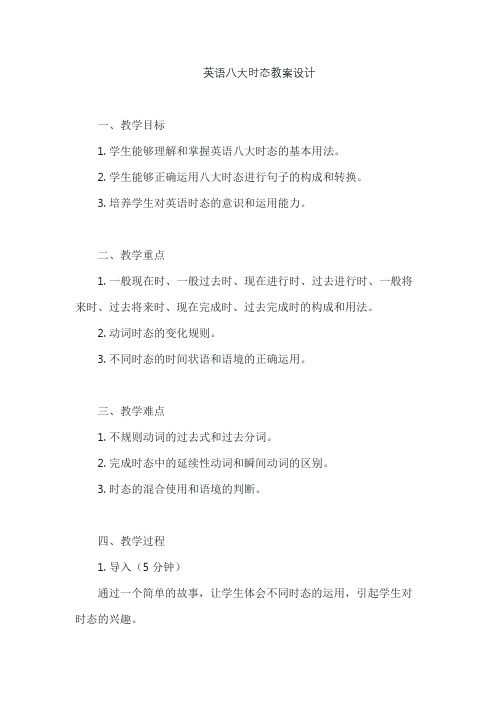
英语八大时态教案设计一、教学目标1. 学生能够理解和掌握英语八大时态的基本用法。
2. 学生能够正确运用八大时态进行句子的构成和转换。
3. 培养学生对英语时态的意识和运用能力。
二、教学重点1. 一般现在时、一般过去时、现在进行时、过去进行时、一般将来时、过去将来时、现在完成时、过去完成时的构成和用法。
2. 动词时态的变化规则。
3. 不同时态的时间状语和语境的正确运用。
三、教学难点1. 不规则动词的过去式和过去分词。
2. 完成时态中的延续性动词和瞬间动词的区别。
3. 时态的混合使用和语境的判断。
四、教学过程1. 导入(5 分钟)通过一个简单的故事,让学生体会不同时态的运用,引起学生对时态的兴趣。
2. 一般现在时(5 分钟)讲解一般现在时的构成和用法,强调第三人称单数的变化规则。
给出一些例句,让学生进行练习。
3. 一般过去时(5 分钟)讲解一般过去时的构成和用法,强调动词过去式的变化规则。
给出一些例句,让学生进行练习。
4. 现在进行时(5 分钟)讲解现在进行时的构成和用法,强调 be 动词和动词 ing 形式的搭配。
给出一些例句,让学生进行练习。
5. 过去进行时(5 分钟)讲解过去进行时的构成和用法,强调 was/were 和动词 ing 形式的搭配。
给出一些例句,让学生进行练习。
6. 一般将来时(5 分钟)讲解一般将来时的构成和用法,强调 will 和 be going to 的区别。
给出一些例句,让学生进行练习。
7. 过去将来时(5 分钟)讲解过去将来时的构成和用法,强调 would 和 was/were going to 的区别。
给出一些例句,让学生进行练习。
8. 现在完成时(5 分钟)讲解现在完成时的构成和用法,强调 have/has 和动词过去分词的搭配。
给出一些例句,让学生进行练习。
9. 过去完成时(5 分钟)讲解过去完成时的构成和用法,强调 had 和动词过去分词的搭配。
给出一些例句,让学生进行练习。
英语动词时态运用教案
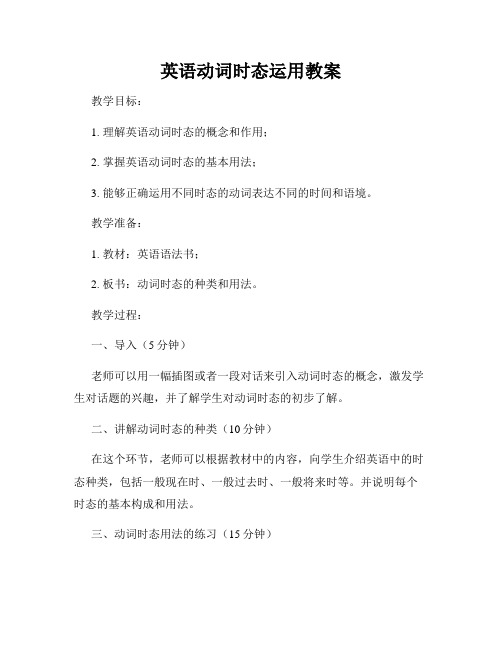
英语动词时态运用教案教学目标:1. 理解英语动词时态的概念和作用;2. 掌握英语动词时态的基本用法;3. 能够正确运用不同时态的动词表达不同的时间和语境。
教学准备:1. 教材:英语语法书;2. 板书:动词时态的种类和用法。
教学过程:一、导入(5分钟)老师可以用一幅插图或者一段对话来引入动词时态的概念,激发学生对话题的兴趣,并了解学生对动词时态的初步了解。
二、讲解动词时态的种类(10分钟)在这个环节,老师可以根据教材中的内容,向学生介绍英语中的时态种类,包括一般现在时、一般过去时、一般将来时等。
并说明每个时态的基本构成和用法。
三、动词时态用法的练习(15分钟)1. 请学生完成一些课堂练习题,让他们通过填写动词的正确时态来加强对时态的理解;2. 让学生用适当的时态来完成一些句子,并用口头或书面方式完成表达,以巩固对时态的掌握。
四、灵活运用动词时态(15分钟)1. 给学生一些情景,让他们根据情景用适当的时态进行说话练习;2. 让学生进行小组讨论,就某个话题用不同的时态进行交流。
五、巩固和拓展(10分钟)1. 老师可以让学生用英语写一篇关于过去经历的短文,要求使用一般过去时;2. 老师可以给学生一些相关阅读材料,让他们阅读并回答相应的时态相关的问题。
六、总结和归纳(5分钟)老师可以和学生一起总结英语动词时态的用法,并让学生列举一些常见的动词时态错误,提高他们对动词时态的注意和掌握能力。
七、作业布置(5分钟)布置作业,要求学生用不同的时态写一篇关于自己日常生活的短文,并指导他们如何正确运用各个时态。
教学反思:通过此次教学,学生能够更好地理解和运用英语动词时态,对不同时态的用法有了更深入的认识。
同时,通过练习和交流,学生的口语和写作能力也有所提高。
为了更好地巩固和拓展学生的知识,老师还可以布置一些额外的练习和作业,让学生继续加强对动词时态的理解和应用。
初中八大时态教案
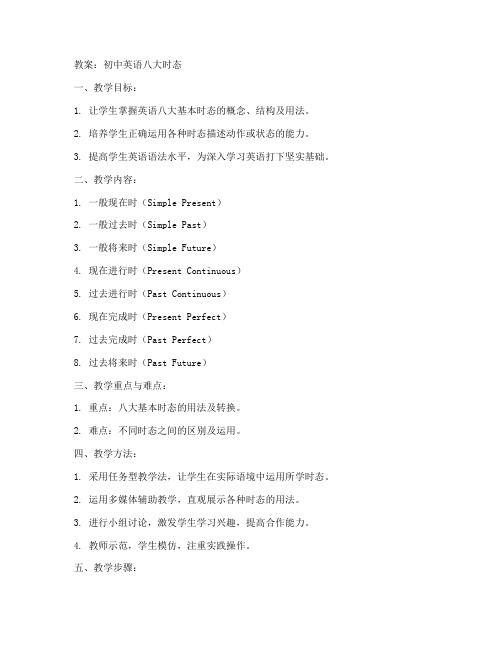
教案:初中英语八大时态一、教学目标:1. 让学生掌握英语八大基本时态的概念、结构及用法。
2. 培养学生正确运用各种时态描述动作或状态的能力。
3. 提高学生英语语法水平,为深入学习英语打下坚实基础。
二、教学内容:1. 一般现在时(Simple Present)2. 一般过去时(Simple Past)3. 一般将来时(Simple Future)4. 现在进行时(Present Continuous)5. 过去进行时(Past Continuous)6. 现在完成时(Present Perfect)7. 过去完成时(Past Perfect)8. 过去将来时(Past Future)三、教学重点与难点:1. 重点:八大基本时态的用法及转换。
2. 难点:不同时态之间的区别及运用。
四、教学方法:1. 采用任务型教学法,让学生在实际语境中运用所学时态。
2. 运用多媒体辅助教学,直观展示各种时态的用法。
3. 进行小组讨论,激发学生学习兴趣,提高合作能力。
4. 教师示范,学生模仿,注重实践操作。
五、教学步骤:1. 导入:简要介绍英语时态的概念及重要性。
2. 新课:讲解八大基本时态的概念、结构及用法。
3. 练习:进行各种时态的填空、改写句子等练习。
4. 小组讨论:分析不同时态在实际语境中的运用。
5. 总结:对比八大时态的区别,加深学生对时态的理解。
6. 作业:布置相关时态的练习题,巩固所学知识。
六、教学评价:1. 课堂参与度:观察学生在课堂上的积极参与程度,了解学习兴趣。
2. 练习正确率:检查学生作业、测验等情况,了解掌握程度。
3. 小组讨论:评估学生在讨论中的表现,提高合作能力。
4. 课后反馈:收集学生对课堂内容的反馈,不断调整教学方法。
通过本节课的学习,使学生掌握英语八大基本时态,能够正确运用各种时态描述动作或状态,为深入学习英语打下坚实基础。
同时,注重培养学生的实践能力,提高英语语法水平。
初中六大时态教案

教案:初中英语六大时态教学目标:1. 理解并掌握六大时态的概念和用法;2. 能够正确运用六大时态进行句子构建;3. 能够区分六大时态的适用情境;4. 提高学生的英语语法水平和表达能力。
教学内容:1. 一般现在时;2. 一般过去时;3. 一般将来时;4. 现在进行时;5. 过去进行时;6. 现在完成时。
教学步骤:Step 1: 引入话题1. 引导学生思考日常生活中常见的动作和状态,如吃饭、睡觉、学习等。
2. 提问学生这些动作和状态是如何用英语表达的。
Step 2: 讲解一般现在时1. 介绍一般现在时的概念和用法;2. 讲解一般现在时的构成,即主语+动词原形;3. 举例说明一般现在时的适用情境,如描述习惯性动作、特征、能力等。
Step 3: 讲解一般过去时1. 介绍一般过去时的概念和用法;2. 讲解一般过去时的构成,即主语+动词过去式;3. 举例说明一般过去时的适用情境,如描述过去发生的动作或状态。
Step 4: 讲解一般将来时1. 介绍一般将来时的概念和用法;2. 讲解一般将来时的构成,即主语+will+动词原形;3. 举例说明一般将来时的适用情境,如描述将来发生的动作或状态。
Step 5: 讲解现在进行时1. 介绍现在进行时的概念和用法;2. 讲解现在进行时的构成,即主语+am/is/are+动词现在分词;3. 举例说明现在进行时的适用情境,如描述正在进行的动作。
Step 6: 讲解过去进行时1. 介绍过去进行时的概念和用法;2. 讲解过去进行时的构成,即主语+was/were+动词现在分词;3. 举例说明过去进行时的适用情境,如描述过去正在进行的动作。
Step 7: 讲解现在完成时1. 介绍现在完成时的概念和用法;2. 讲解现在完成时的构成,即主语+have/has+动词过去分词;3. 举例说明现在完成时的适用情境,如描述已经发生的动作或状态。
Step 8: 练习与巩固1. 让学生分组进行练习,互相构造句子使用六大时态;2. 教师选取一些练习题目,让学生回答;3. 引导学生通过实例来区分六大时态的适用情境。
初中英语8大常用时态教案

初中英语8大常用时态教案一、教学目标:1. 让学生掌握英语八种常用时态(一般现在时、一般过去时、一般将来时、现在进行时、过去进行时、现在完成时、过去完成时、被动语态)。
2. 让学生能够正确运用这些时态描述动作或状态。
3. 培养学生运用英语进行交际的能力。
二、教学内容:1. 一般现在时:表示经常性或习惯性动作,现在的状态、特征、职业、能力、感觉等。
2. 一般过去时:表示过去某个时间里发生的动作或状态,过去习惯性、经常性的动作、行为。
3. 一般将来时:表示将来会发生的事情,将来会发生的动作。
4. 现在进行时:表示正在进行的动作或存在的状态。
5. 过去进行时:表示过去某个时刻正在进行的动作。
6. 现在完成时:表示过去发生的事情对现在造成的影响或结果。
7. 过去完成时:表示在过去某个时间点之前已经完成的动作。
8. 被动语态:表示动作的承受者。
三、教学步骤:1. 引入:通过日常对话,引导学生关注不同时间点的动作或状态,激发学生对时态的兴趣。
2. 讲解:a. 一般现在时:讲解概念、时间状语、肯定句、否定句、一般疑问句。
b. 一般过去时:讲解概念、时间状语、肯定句、否定句、一般疑问句。
c. 一般将来时:讲解概念、时间状语、肯定句、否定句、一般疑问句。
d. 现在进行时:讲解概念、时间状语、肯定句、否定句、一般疑问句。
e. 过去进行时:讲解概念、时间状语、肯定句、否定句、一般疑问句。
f. 现在完成时:讲解概念、时间状语、肯定句、否定句、一般疑问句。
g. 过去完成时:讲解概念、时间状语、肯定句、否定句、一般疑问句。
h. 被动语态:讲解概念、时间状语、肯定句、否定句、一般疑问句。
3. 练习:提供适量练习题,让学生运用所学时态进行填空、改写句子等操作。
4. 小组活动:学生分组,进行角色扮演,运用所学时态进行对话。
5. 总结:对本节课所学内容进行总结,强调重点和难点。
四、教学评价:1. 课堂参与度:观察学生在课堂上的积极参与程度,回答问题、练习、对话等情况。
英语时态优秀教学设计名师公开课获奖教案百校联赛一等奖教案
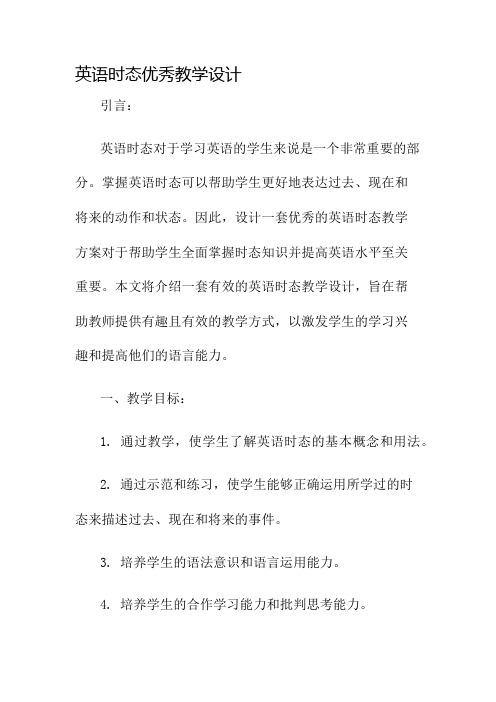
英语时态优秀教学设计引言:英语时态对于学习英语的学生来说是一个非常重要的部分。
掌握英语时态可以帮助学生更好地表达过去、现在和将来的动作和状态。
因此,设计一套优秀的英语时态教学方案对于帮助学生全面掌握时态知识并提高英语水平至关重要。
本文将介绍一套有效的英语时态教学设计,旨在帮助教师提供有趣且有效的教学方式,以激发学生的学习兴趣和提高他们的语言能力。
一、教学目标:1. 通过教学,使学生了解英语时态的基本概念和用法。
2. 通过示范和练习,使学生能够正确运用所学过的时态来描述过去、现在和将来的事件。
3. 培养学生的语法意识和语言运用能力。
4. 培养学生的合作学习能力和批判思考能力。
二、教学内容:1. 时态的基本概念和分类。
2. 各时态的构成和用法。
3. 时态的交替使用以及常见错误。
三、教学步骤:1. 引入新知识引入新知识时,可以选择使用图片、小故事或生动的例子来引起学生的兴趣。
以一段简短的对话或题目的形式向学生展示一种时态的用法,并鼓励学生猜测它的含义和用法。
2. 知识讲解与示范向学生详细讲解各个时态的构成和用法,并通过示范句子来帮助学生理解。
教师可以使用多媒体工具或黑板写字来展示时态的规则和例子。
3. 练习与巩固在学生掌握了时态的基本概念后,进行一些练习来巩固所学内容。
可以使用填空题、选择题或造句题来让学生进行练习,帮助他们更好地掌握时态的应用。
4. 拓展和应用在学生基本掌握时态的应用后,教师可以为学生设计一些拓展和应用活动,如小组讨论、演讲、写作或角色扮演等,以提高学生的语言运用能力和创造力。
5. 总结与评价教师对本节课的教学进行总结,并给予学生正面的评价,鼓励学生做得更好。
同时,教师也可以针对学生在学习中可能存在的问题进行必要的指导和反馈。
四、教学评估:教学评估是帮助教师了解学生掌握情况的重要环节。
可以设计一些简单的选择题、填空题或问答题来检测学生对于时态的理解和运用能力。
五、提供资源:为了帮助学生自主学习和巩固所学内容,可以向学生推荐一些优质的在线学习资源,如电子书籍、在线课程或语法练习网站等。
初中6个基本时态教案

教案:初中英语六种基本时态教学一、教学目标:1. 知识目标:让学生掌握英语六种基本时态(一般现在时、一般过去时、一般将来时、现在进行时、过去进行时、过去完成时)的定义、结构及用法。
2. 能力目标:培养学生运用英语六种基本时态进行口语表达和书面表达的能力。
3. 情感目标:激发学生学习英语的兴趣,培养学生的自信心,使学生在学习过程中感受到英语学习的乐趣。
二、教学重点与难点:1. 教学重点:英语六种基本时态的定义、结构及用法。
2. 教学难点:英语六种基本时态的区分和运用。
三、教学步骤:1. 导入:通过提问方式引导学生回顾已学过的动词形式,为新课学习做好铺垫。
2. 讲解:(1)一般现在时:表示经常发生的事情、普遍真理和习惯。
(2)一般过去时:表示过去发生的事情。
(3)一般将来时:表示将来会发生的事情。
(4)现在进行时:表示正在发生的事情。
(5)过去进行时:表示过去正在发生的事情。
(6)过去完成时:表示在过去某个时间点之前已经完成的事情。
3. 练习:(1)让学生用六种基本时态分别造句,加深对时态的理解。
(2)进行时态辨析练习,提高学生对时态的运用能力。
4. 课堂活动:分组进行角色扮演,让学生在实际语境中运用六种基本时态。
5. 总结:对本节课所学内容进行总结,强调六种基本时态的用法及区分。
6. 作业布置:让学生课后用六种基本时态写一篇小短文,巩固所学知识。
四、教学反思:在教学过程中,要注意引导学生通过实际语境来感知和运用六种基本时态,提高学生的口语表达和书面表达能力。
同时,要关注学生的学习进度,及时解答学生的疑问,确保教学效果。
高中英语八大时态教案模板
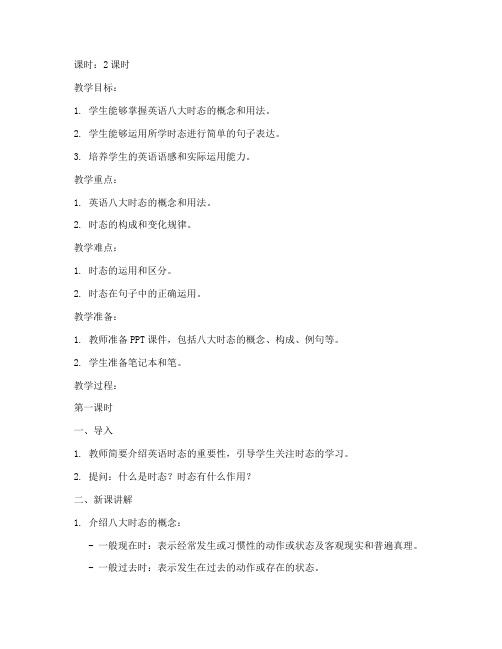
课时:2课时教学目标:1. 学生能够掌握英语八大时态的概念和用法。
2. 学生能够运用所学时态进行简单的句子表达。
3. 培养学生的英语语感和实际运用能力。
教学重点:1. 英语八大时态的概念和用法。
2. 时态的构成和变化规律。
教学难点:1. 时态的运用和区分。
2. 时态在句子中的正确运用。
教学准备:1. 教师准备PPT课件,包括八大时态的概念、构成、例句等。
2. 学生准备笔记本和笔。
教学过程:第一课时一、导入1. 教师简要介绍英语时态的重要性,引导学生关注时态的学习。
2. 提问:什么是时态?时态有什么作用?二、新课讲解1. 介绍八大时态的概念:- 一般现在时:表示经常发生或习惯性的动作或状态及客观现实和普遍真理。
- 一般过去时:表示发生在过去的动作或存在的状态。
- 现在进行时:表示现在或现在这段时间正在进行的动作。
- 过去进行时:表示过去的某一时刻或者某个阶段时间正在进行的动作。
- 一般将来时:表示将要发生的动作或存在的状态。
- 过去将来时:表示在过去某个时间将要发生的动作或存在的状态。
- 现在完成时:表示从过去某一时间开始一直持续到现在的动作或状态。
- 过去完成时:表示在过去某个时间之前已经完成的动作或状态。
2. 介绍八大时态的构成和变化规律:- 一般现在时:be动词 + 动词原形;否定形式:be动词 + not + 动词原形。
- 一般过去时:be动词 + 过去式;否定形式:be动词 + not + 过去式。
- 现在进行时:be动词 + 现在分词;否定形式:be动词 + not + 现在分词。
- 过去进行时:be动词 + 过去进行式;否定形式:be动词 + not + 过去进行式。
- 一般将来时:will + 动词原形;否定形式:will not + 动词原形。
- 过去将来时:would + 动词原形;否定形式:would not + 动词原形。
- 现在完成时:have/has + 过去分词;否定形式:have/has not + 过去分词。
高中英语动词时态教案5篇
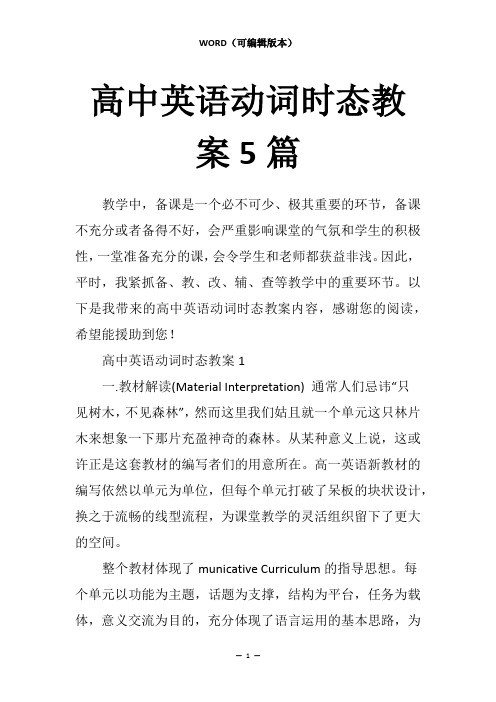
高中英语动词时态教案5篇教学中,备课是一个必不可少、极其重要的环节,备课不充分或者备得不好,会严重影响课堂的气氛和学生的积极性,一堂准备充分的课,会令学生和老师都获益非浅。
因此,平时,我紧抓备、教、改、辅、查等教学中的重要环节。
以下是我带来的高中英语动词时态教案内容,感谢您的阅读,希望能援助到您!高中英语动词时态教案1一.教材解读(Material Interpretation) 通常人们忌讳“只见树木,不见森林”,然而这里我们姑且就一个单元这只林片木来想象一下那片充盈神奇的森林。
从某种意义上说,这或许正是这套教材的编写者们的用意所在。
高一英语新教材的编写依然以单元为单位,但每个单元打破了呆板的块状设计,换之于流畅的线型流程,为课堂教学的灵活组织留下了更大的空间。
整个教材体现了municative Curriculum的指导思想。
每个单元以功能为主题,话题为支撑,结构为平台,任务为载体,意义交流为目的,充分体现了语言运用的基本思路,为任务型课堂教学构建了框架,注重提高学生用英语获取信息、处理信息、分析和解决问题的能力,发展学生与人沟通和合作的能力。
本单元的主题是Technology,中心话题为Hi-tech,话题本身具有强烈的时代气息,贴近学生的实际生活,符合学生的认知水平,在学生中有较强的认同感。
这一单元的交际功能项目(Functional Item)有两个:1. Describing things2. Expressing agreement disagreement。
结构项目(Structure)为The Present Continuous Passive Voice;主要能力项目为Reading 和Writing,其中一个阅读正篇,两个Language Input, 要求学生学会阅读并在阅读中培养根据上下文或构词法理判断词义的能力,同时学会写信并在信中阐述问题的症结,发表自己的观点。
拓展项目为如何运用高科技获取更多英语信息,提升英语学习,并探究科技为人类带来便利的同时可能存在的负面影响以及消除这些影响的解决办法。
初中英语时态教案
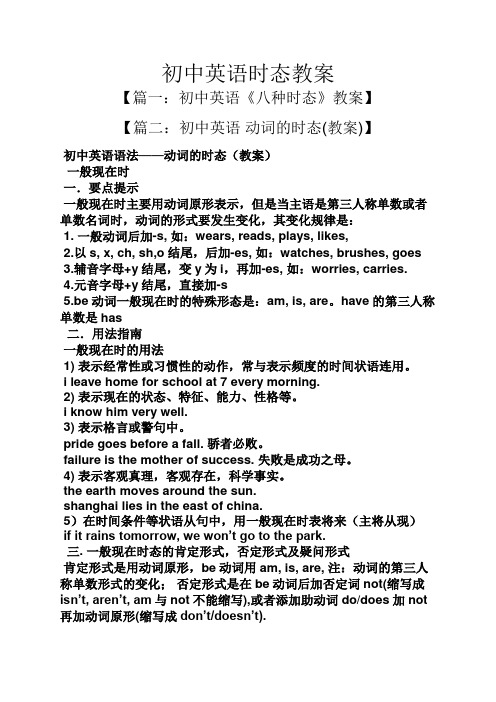
初中英语时态教案【篇一:初中英语《八种时态》教案】【篇二:初中英语动词的时态(教案)】初中英语语法——动词的时态(教案)一般现在时一.要点提示一般现在时主要用动词原形表示,但是当主语是第三人称单数或者单数名词时,动词的形式要发生变化,其变化规律是:1. 一般动词后加-s, 如:wears, reads, plays, likes,2.以s, x, ch, sh,o结尾,后加-es, 如:watches, brushes, goes3.辅音字母+y结尾,变y为i,再加-es, 如:worries, carries.4.元音字母+y结尾,直接加-s5.be动词一般现在时的特殊形态是:am, is, are。
have的第三人称单数是has二.用法指南一般现在时的用法1) 表示经常性或习惯性的动作,常与表示频度的时间状语连用。
i leave home for school at 7 every morning.2) 表示现在的状态、特征、能力、性格等。
i know him very well.3) 表示格言或警句中。
pride goes before a fall. 骄者必败。
failure is the mother of success. 失败是成功之母。
4) 表示客观真理,客观存在,科学事实。
the earth moves around the sun.shanghai lies in the east of china.5)在时间条件等状语从句中,用一般现在时表将来(主将从现)if it rains tomorrow, we won’t go to the park.三. 一般现在时态的肯定形式,否定形式及疑问形式肯定形式是用动词原形,be动词用am, is, are, 注:动词的第三人称单数形式的变化;否定形式是在be动词后加否定词not(缩写成isn’t, aren’t, am与not不能缩写),或者添加助动词do/does加not 再加动词原形(缩写成don’t/doesn’t).疑问形式是把be动词或助动词do/does提置句首, 动词还原,句末问号,人称上第一人称变第二人称,第二人称变第一人称或不变,第三人称不变。
- 1、下载文档前请自行甄别文档内容的完整性,平台不提供额外的编辑、内容补充、找答案等附加服务。
- 2、"仅部分预览"的文档,不可在线预览部分如存在完整性等问题,可反馈申请退款(可完整预览的文档不适用该条件!)。
- 3、如文档侵犯您的权益,请联系客服反馈,我们会尽快为您处理(人工客服工作时间:9:00-18:30)。
英语时态教案【篇一:初中英语时态教案】初中英语时态复习巩固“三个一般,两个进行,两个完成”现在进行时现在完成时一般过去时一般将来时过去进行时过去完成时一、一般现在时(概念,句式结构,常用时间状语;用法)1、概念,句式结构,常用时间状语。
(1)概念:一般现在是主要表示经常性或习惯性的动作或存在的状态,也可表示现在的情况或状态以及永恒的真理。
(2)句式结构:be(is , am , are) +表语,如:she is a beautiful girl.there be (is , are )句型,如:there is a schoolbag on the desk.实义动词作谓语, 谓语用动词原形,但主语是第三人称单数时,谓语要用相应的单数第三人称形式如: they usually go to school on foot.she likes chocolate.(3)常用时间状语:always, usually, often, everyday等。
2.一般现在时的用法(1)表示经常性或习惯性的动作或存在的状态,常与表频度的时间状语连用。
如:my mother often does housework. 我妈妈经常做家务。
(2) 描述现在的情况,状态等。
如:he speaks russian very well.他讲俄语讲得很好。
(3) 描述客观真理、客观存在或科学事实等。
如:light travels faster than sound.光比声音传播速度快。
(4)注:在含时间状语从句或条件状语从句的复合句中,若主句用一般将来时,则从句用一般现在时表示将来,即“主将从现”如:i will ring you if he comes back tomorrow.如果他明天回来,我就给你打电话。
例: i will send you an e-mail as soon as i _________in canada.a. arriveb arrivedc am arriving d will arrive(5) 在以here , there开头的句子中常用一般现在时代替进行时。
如:here comes the bus! 汽车来了!二、一般过去时 (概念,句式结构以及常用的时间状语; 动词过去式的构成,一般过去时的用法)1. 概念,句式结构及常用的时间状语(1)概念:表示过去发生的动作或存在的状态。
(2)句式结构 was/were+表语 she was a beautiful girl ten years ago.was/were there were many shops near our school.实义动词作谓语he got up at six o’clock yesterday morning. (4) 常用的时间状语: yesterday(昨天), the day before yesterday (前天), lastweek (上星期),two days ago (两天前),just now (刚才)等2. 动词过去式的构成方式一般过过去式中,谓语动词要用一般过去式,过去式的变化分为规则(见七年级上册102页)和不规则两种(不规则动词表见八年级上册116页)3.一般过去时的用法(1)表示过去发生或过去经常发生的动作或存在的状态。
如: he visited the great wall yesterday. 昨天他旅游了长城。
he went to the hospital once a week last week. 去年他每周去医院一次。
例: i’m now in new york with my friend jenny. we __________ by plane on monday.a arriveb arrivedc are arriving d will arrive( 2) 用于虚拟条件句中,表示与现在事实相反的情况。
如: if i were you, i would take a small present.如果我是你的话,我就带上一小件小礼物。
注: if i were you 中, were 不能改成was。
三、一般将来时(概念,句式结构以及常用的时间状语,用法)1. 概念,句式结构以及常用的时间状语(1)概念: 表示将来要发生的动作或存在的状态。
(2)句式结构will/shall + 动词原形 they will have a good time. + 动词原形 we are going to take an exam.现在进行时表将来the bus is coming. 公共汽车要来了。
(3)常用的时间状语:tomorrow, the day after tomorrow , in two hours , soon ,in the future等 2.一般将来时的用法(1)be going to 和will 表示将要发生的动作或存在的状态。
we are going to have a meeting to discuss the plan.我们打算开会讨论这个计划。
she will reach here at five o’clock this afternoon. 今天下午五点她将到达这里。
例. my sister wants a new dress. she ______ it to the party. a wearsb has wonc wore d is going to wear(2) be going to 表示根据某种迹象判断将要发生某事, will 表示客观上将来势必发生的事。
如:look at the dark clouds. it’s going to rain.看那乌云,天马上要下雨了。
he will be twenty years old next year.明年他就要20岁了。
例. there __________a basketball match between class oneand class threethis afternoon.a is going to beb will havec are going to bed is going to have 注:there be的一般将来式是there is/are going to be 或there will be 选a练习1. my parents often ______ a walk after supper. they are both very healthy.(have)2. the student __________ to school three days last week. so he can’t finish his last week’shomework. (not go)3. this year alone mr. wu ____________ a cold twice. the students all say that he needs to domuch exercise in the morning.(catch)4. the students said that they ____________ from school in three months. (graduate)5. the girl is friendly to her grandmother. she usually ________ to see her grandmother oncea week.(go)6. those tourists _______ in kunming at ten o’clock yesterday morning. (arrive)7. ___________ your son or your daughter__________ after you, mr. green? (take) 8. i don’t know what mr. chang’s wife does. i think she may _________ a conductor.(be) 9. ---- zhang xiaohui, have you been to beijing?---- not yet . my father tells me that he __________ me there by the year 2012.(take)两个进行时态一.现在进行时 (概念,句式结构,常用的时间状语及用法) 1.概念,句式结构及常见的时态标志词 (1).概念: 表示现在正在进行的动作(2).句式结构: 主语+ am/is / are +现在分词+其他(3).常见的时态标志词:now, at the moment, look, listen等 2.现在分词的构成方式 3.现在进行时的用法:(1). 表示目前正在进行的动作。
如:she is reading a book. 她正在读书。
例:where’s tom? his mother __________ him now.a. is looking forb. will look forc. has looked ford. looks for(2). 与always,usually,forever等词连用,表示说话者的赞扬、厌恶或不满情绪等。
如:he is always helping others. we all like him. 他总是帮助别人,我们都很喜欢他。
(3).一些表示位置移动的动词,如go , come, leave等常用现在进行时表示将来发生的;动作。
如:he is leaving for shanghai tomorrow. 特别提醒:以下动词通常不用于现在进行时①表示感觉、情感或心理活动的动词,如: hear, listen,look,smell, taste,notice,seem, hate, like , want, love, want, wish等②表示所有或占有的动词,如:have, own, belong等③表示记忆,理解或决定的动词,如:forget, remember,understand, believe,know,decide二.过去进行时(概念,句式结构及常用的时间状语和用法) 1. 概念,句式结构及常用的时间状语(1).概念:表示过去某个时刻或某段时间正在进行的动作。
(2).句式结构:主语+was/were+现在分词+其他当主语为一、三人称时用was,其余用were。
